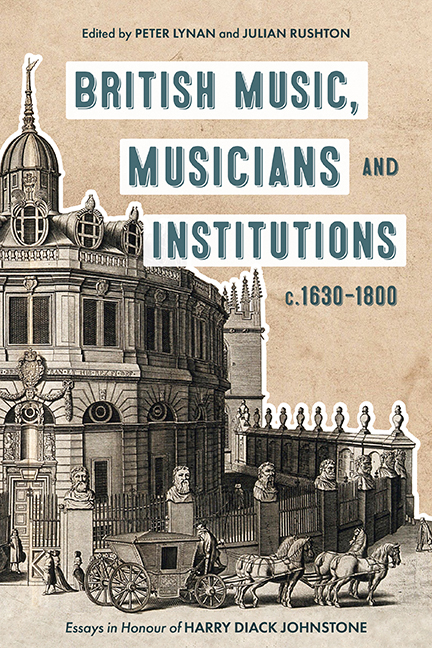Book contents
- Frontmatter
- Contents
- List of Illustrations
- List of Music Examples
- List of Contributors
- Acknowledgements
- List of Abbreviations
- Note to the Reader
- Introduction
- Part I Performers and Performance Style
- Part II Composers and Secular Institutions
- Part III Sacred Music and Institutions
- Part IV Dissemination: Copying, Printing, and Publishing
- Epilogue: Musica Britannica and the Eighteenth Century
- Harry Diack Johnstone: A Tribute
- Bibliography of the Publications of Harry Diack Johnstone
- Index
- Tabula Gratulatoria
4 - J.C. Bach and the ‘true Organ Style’: Propriety and Impropriety in Eighteenth-Century English Organ Music
Published online by Cambridge University Press: 06 October 2022
- Frontmatter
- Contents
- List of Illustrations
- List of Music Examples
- List of Contributors
- Acknowledgements
- List of Abbreviations
- Note to the Reader
- Introduction
- Part I Performers and Performance Style
- Part II Composers and Secular Institutions
- Part III Sacred Music and Institutions
- Part IV Dissemination: Copying, Printing, and Publishing
- Epilogue: Musica Britannica and the Eighteenth Century
- Harry Diack Johnstone: A Tribute
- Bibliography of the Publications of Harry Diack Johnstone
- Index
- Tabula Gratulatoria
Summary
I remember the Performance of La Passione, of Jomelli; and of Gioas, Re di Giuda, composed by John Christian Bach […] Between the Acts of these Italian Oratorios, Bach endeavour’d to play a Concerto upon the organ, (by the express command of her Majesty, who as well as his Majesty were present,) But this Concerto gave no pleasure to the Audience, and was absolutely hissed: all our boys laughed at the exhibition; so different was it from the true Organ Style of playing, to which we had been accustomed from hearing Worgan, Michael Arne, Doctor Dupuis, and Jonathan Battishill, unquestionably some of the greatest organists of the English School in their day.
Johann Christian Bach arrived in London in the summer of 1762, lured there from Italy by the prospect of success as an opera composer and by the financial rewards attainable in perhaps the most commercially vibrant musical centre in Europe, and there he settled for the remaining twenty years of his life. Almost immediately his impact was felt, and not only in the opera house. Apart from the King's Theatre, which became the focal point of his operatic career, Bach was a motivator in the city's concert life. With Carl Friedrich Abel in 1765 he began collaborating on the subscription concerts that came to bear their names and which figured conspicuously in the calendars of the well-to-do. Commercially minded, he also embraced opportunities to publish his compositions, helping to cultivate an estimable reputation in Britain and on the continent. In 1763 his first set of keyboard concertos was published, and this, with two later sets (1770, 1777), formed a substantial contribution to a genre that owed much of its popularity in Britain to Handel, who had played organ concertos in the intervals of his oratorios from the 1730s.
Bach's prominence as a musician was complemented by his favourable social status: moving in influential circles, he was soon a beneficiary of royal patronage, becoming music master to the queen. His compositions appealed widely, infiltrating a range of cultural milieux from exclusive professional concerts to the fashionable but socially mixed pleasure gardens.
- Type
- Chapter
- Information
- British Music, Musicians and Institutions, c. 1630-1800Essays in Honour of Harry Diack Johnstone, pp. 72 - 88Publisher: Boydell & BrewerPrint publication year: 2022

